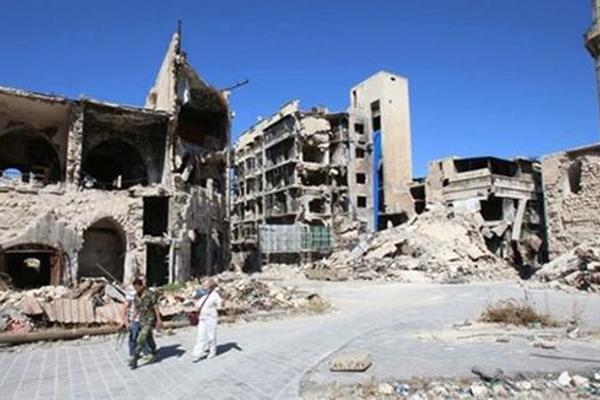US-led forces strike Syrian troops, prompting reaction
BEIRUT/MOSCOW


A Syrian government soldier and unidentified people walk in the damaged Khan al-Wazir market in the government-held side of Aleppo's historic city center on September 16, 2016. AFP photo
U.S.-led coalition air strikes killed dozens of Syrian soldiers on Sept. 17, endangering a U.S.-Russian brokered cease-fire and prompting an emergency U.N. Security Council meeting as tensions between Moscow and Washington escalated.The United States military said the coalition stopped the attacks against what it had believed to be Islamic State of Iraq and the Levant (ISIL) positions in northeast Syria after Russia informed it Syrian military personnel and vehicles may have been hit, according to Reuters.
The statement said coalition forces “would not intentionally strike a known Syrian military unit,” AFP reported.
The Russian Defense Ministry said on Sept. 17 that U.S. jets had killed more than 60 Syrian soldiers in the northeastern Syrian city of Deir Ezzor in four air strikes by two F-16s and two A-10s coming from the direction of Iraq.
The Syrian Observatory for Human Rights, a Britain-based monitoring group with contacts across Syria, cited a military source at Deir Ezzor airport as saying at least 90 Syrian soldiers had been killed.
Pentagon Press Secretary Peter Cook said in an emailed statement that Russian officials did not voice concerns earlier on Sept. 17 when informed that coalition aircraft would be operating in the strike area.
The Russian Foreign Ministry said Sept. 18 in a strongly-worded statement that the United States’ position on the incident was “unconstructive and inarticulate.”
“The actions of coalition pilots - if they, as we hope, were not taken on an order from Washington - are on the boundary between criminal negligence and connivance with Islamic State [ISIL] terrorists,” the ministry said.
“We strongly urge Washington to exert the needed pressure on the illegal armed groups under its patronage to implement the cease-fire plan unconditionally. Otherwise the implementation of the entire package of the U.S.-Russian accords reached in Geneva on Sept. 9 may be jeopardized.”
Russia has repeatedly called on the United States to push units of moderate Syrian opposition to separate from ISIL and other “terrorist groups.”
Australia, which said it was one of several coalition countries whose aircraft took part, offered its “condolences to the families of any Syrian personnel killed or wounded.”
Washington further unnerved Moscow when its envoy to the United Nations abruptly left her seat as the Russian representative took the floor to condemn the air strikes at an emergency U.S. Security Council meeting.
“We are reaching a really terrifying conclusion for the whole world: That the White House is defending Islamic State [ISIL]. Now there can be no doubts about that,” Russian Foreign Ministry spokeswoman Maria Zakharova said in comments aired by state TV.
The U.S. ambassador to the United Nations, Samantha Power, said Zakharova should be embarrassed by that claim. Russia’s U.N. representative, Vitaly Churkin, said Russia had no “specific evidence” of the U.S. colluding with ISIL militants.
The diplomatic row is likely to further complicate the delivery of humanitarian aid to Syria, including its largest pre-war city of Aleppo, where the situation remains especially tense and the fragile truce that started on Sept. 12 has been repeatedly violated.
The U.N. told Reuters that aid trucks which had been expected to move to Aleppo on Sept. 18 were once again being delayed.
“It’s a tough moment,” one top aid official in Geneva told Reuters. “The U.N. convoys are highly politicized.”
The Syrian army, meanwhile, said the raid had allowed ISIL fighters to gain ground around the key eastern airbase of Deir Ezzor, but a military source said government forces were back on the offensive on Sept. 18, AFP reported.
“The army has retaken most of its positions on Jabal Therdeh with Russian and Syrian air support,” the source said, referring to a hilltop overlooking the base. Retaking those positions was vital to prevent ISIL using them to fire on army aircraft taking off or landing at the base.
